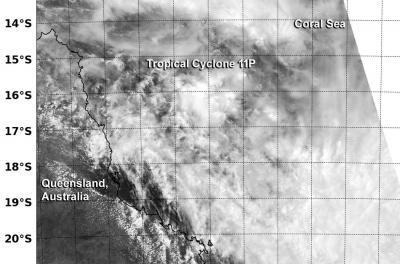The NASA-NOAA Satellite known as Suomi NPP flew over newborn Tropical Cyclone 11P in the Coral Sea and captured a visible image of the newly developed storm as it moves toward a landfall in Queensland, Australia. Tropical Cyclone 11P developed from the low pressure area previously known as System 99P.
The VIIRS instrument aboard Suomi NPP captured an image of 11P on January 28 at 04:19 UTC/Jan. 27 at 11:19 p.m. EST. The image showed a more rounded circulation than the previous day, and bands of thunderstorms over the storm's southern semi-circle.
The Australian Bureau of Meteorology or ABM has issued a Cyclone Warning for coastal and island communities from Cairns to St Lawrence, including Townsville and Mackay. A Cyclone Watch remained in effect for communities through the eastern interior including Charters Towers and Moranbah. For updated warnings and watches, please visit ABM's website at: http://www.bom.gov.au

NASA-NOAA's Suomi NPP satellite captured this image of Tropical Cyclone 11P on Jan. 28 at 04:19 UTC, revealing a more rounded circulation than the previous day, and bands of thunderstorms over the storm's southern semi-circle.
(Photo Credit: NASA/NOAA/NRL)
11P was passing near Willis Island, and according to the Joint Typhoon Warning Center or JTWC, the radar there indicated that the low-level center was better organized, but bands of thunderstorms appeared fragmented and loosely organized.
At 1500 UTC/10 a.m. EST on January 29, Tropical Cyclone 11P had maximum sustained winds near 35 knots/40 mph/62 kph. It was centered 247 nautical miles/284.2 miles/457.5 km east of Cairns, Australia, near 17.1 south and 149.8 east. Tropical Cyclone 11P is moving to the southwest at 6 knots/6.9 mph/11.1 kph.
The JTWC expects 11P to strengthen to 50 knots before making landfall. The JTWC forecast calls for landfall around 0000 UTC on January 31/7 p.m. EST on January 30 and the ABM forecast calls for 11P to cross the Queensland coast between Lucinda and Proserpine on January 31, Friday morning.
Source: NASA/Goddard Space Flight Center